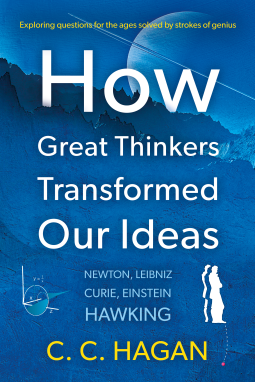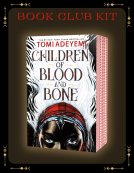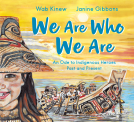
How Great Thinkers Transformed Our Ideas
Share the insights of Newton, Hawking, Curie and other geniuses
by C C Hagan
This title was previously available on NetGalley and is now archived.
Send NetGalley books directly to your Kindle or Kindle app
1
To read on a Kindle or Kindle app, please add kindle@netgalley.com as an approved email address to receive files in your Amazon account. Click here for step-by-step instructions.
2
Also find your Kindle email address within your Amazon account, and enter it here.
Pub Date 28 May 2024 | Archive Date 30 Jun 2024
Talking about this book? Use #HowGreatThinkersTransformedOurIdeas #NetGalley. More hashtag tips!
Description
"Dare to think!”
This was the catch cry of the Enlightenment over 300 years ago when the breakaway from religion towards a more secular society began. Isaac Newton led the Scientific Revolution which transformed society for the next 300 years with progress not then dreamed of. Stephen Hawking revealed a new cosmology and linked Einstein’s relativity to small scale quantum mechanics. Yet what was the mind set of Newton’s age compared to Hawking’s age? What were the changes in the mind sets of society and philosophy during those 300 years and were they all linked to science?
This book represents a slice of the history of ideas, science and philosophy mixed with their personal lives against how science, mathematics and philosophy evolved over those 300 years. Revealed are the truly astonishing stories and ideas of five of the greatest thinkers who ever lived who provided us rich insights into the cosmos. Their stories class them as true founders of scientific revolutions, battlers with feats of endurance, and triumphs to rise to great heights. Through the personal tragedies of Curie and Hawking to the intellectual battles fought by Einstein, Newton and Leibniz these five scientists inspire us and enrich our ideas.
A Note From the Publisher
Available Editions
| EDITION | Ebook |
| ISBN | 9781805148265 |
| PRICE | £7.99 (GBP) |
| PAGES | 488 |
Links
Available on NetGalley
Average rating from 10 members
Featured Reviews
 Reviewer 1425155
Reviewer 1425155
I loved reading this. I really enjoyed how informative this book was about their ideas and learning about their work was very fun.
A great book and very interesting and informative. I’m a scientist at heart, and as a college student, this book provided lots of amazing and interesting insight into the development of the theories I’ve been learning about in my classes. It also informed me more on the various interactions of all the great players of the time, and how each of them influenced and further developed the ideas of others.
 Zsolt Z, Reviewer
Zsolt Z, Reviewer
A book like "How Great Thinkers Transformed Our Ideas" by C.C. Hagan offers a unique synthesis and perspective that even a comprehensive database of human knowledge might not inherently provide. Here's how it adds value:
Contextual Narratives
Historical and Personal Context: The book weaves personal stories of Newton, Curie, Einstein, Hawking, and Leibniz into the broader historical and philosophical context. This synthesis offers insights into how their personal experiences influenced their scientific endeavors, often missing in purely factual accounts.
Philosophical Insights: Hagan discusses the shifts in societal and philosophical mindsets over 300 years, examining how these changes influenced scientific progress. This contextual analysis is crucial for understanding the broader impact of their work.
Integration of Disciplines
Interdisciplinary Approach: The book integrates history, philosophy, and science, showing how these fields have influenced each other. This holistic view provides new insights into the interconnectedness of different disciplines.
Evolution of Ideas: It tracks the evolution of scientific ideas from the Enlightenment to modern times, highlighting how each thinker built on the work of their predecessors.
Human Element
Personal Struggles and Triumphs: By detailing the personal challenges and triumphs of these scientists, the book humanizes them, providing inspiration and a deeper emotional connection. Understanding their struggles can be as enlightening as their scientific achievements.
Motivational Aspects: The stories of endurance and intellectual battles serve as motivational narratives, encouraging readers to persevere in their own intellectual pursuits.
New Interpretations and Theories
Author's Interpretation: Hagan’s interpretation and analysis of these thinkers' works and their impact might introduce new perspectives or theories not covered in other sources.
Modern Relevance: The book discusses the relevance of these historical figures' ideas in the context of contemporary scientific and philosophical debates.
Accessible Summarization
Concise Summaries: For those on the “slow lane,” the detailed narratives are beneficial, while for time-pressed readers, the book's summaries and key points quickly convey the essential information.
Educational Value: The book serves as an educational tool, providing a structured and engaging way to learn about significant scientific revolutions and their ongoing impact.
Example: Isaac Newton
Contextual Narrative: Hagan explores Newton's role in the Scientific Revolution, detailing how his personal religious beliefs and political context influenced his scientific work.
Integration of Disciplines: The discussion includes Newton’s contributions to mathematics, physics, and their philosophical implications.
Personal Element: Insights into Newton's solitary nature and intense focus on his work provide a deeper understanding of his character.
New Interpretations: Hagan might offer new interpretations of Newton's lesser-known works, such as his alchemical studies.
Personal Opinion
As someone who has always been fascinated by the intersections of science and philosophy, I found "How Great Thinkers Transformed Our Ideas" to be an enlightening read. Hagan's ability to humanize these intellectual giants made their groundbreaking ideas both accessible and profoundly impactful. The book not only deepened my understanding of their contributions but also inspired me to explore adaptive learning techniques driven by AI to utilize this book's content. This seven minutes video I produced was inspired by this book. The same video on Loom is also available for an enhanced social media experience.
7. Potential Limitations
While the book excels in providing a broad overview of the intellectual contributions of great thinkers, some readers might find the treatment of certain topics somewhat overwhelming due to the extensive details and numerous references. For those seeking an in-depth analysis, the book's content requires a significant investment in deep reading or the effective use of AI assistance. Additionally, a deeper exploration of contemporary applications of these historical ideas could be further enriched with this custom-built GPT, offering a new level of interactivity that is bound to emerge as authors discover these new AI-driven options. Until C.C. Hagan develops his official Custom GPT, here is one that I built for both readers of this well-written book and those considering purchasing it.
Target Audience
This book is an excellent resource for anyone with a keen interest in the history of ideas, including students, educators, and lifelong learners. It’s particularly valuable for readers who appreciate interdisciplinary approaches and enjoy exploring the personal stories behind scientific discoveries. Whether you are a novice seeking a comprehensive introduction or a seasoned scholar looking for a refreshing narrative on familiar concepts, "How Great Thinkers Transformed Our Ideas" offers insights that cater to a wide range of readers.
I especially recommend this book to those interested in testing their skills with Adaptive AI-Powered learning. The detailed content serves as both a rich reference and a rewarding challenge for personalizing the adaptation process. Personally, I found it both stimulating and rewarding to adapt it to my own learning style and personality.
Writing Style
The writing style of "How Great Thinkers Transformed Our Ideas" by C.C. Hagan is characterized by several key features:
Engaging and Accessible: Hagan's writing makes complex scientific ideas understandable for a general audience by blending historical facts with philosophical insights.
Chronological Organization: The book is structured chronologically, allowing readers to see the progression of ideas and how each thinker's work built upon the previous ones.
Humanizing Intellectual Figures: The author portrays the scientists not just as intellectual giants but as real people facing immense personal challenges, adding depth to their stories.
Clear and Concise Language: Hagan employs clear and concise language with occasional technical terms explained in layman’s terms to enhance the reader's understanding of complex theories.
Interdisciplinary Approach: The book integrates history, philosophy, and science, showing how these fields have influenced each other. This holistic view provides new insights into the interconnectedness of different disciplines.
Overall, Hagan's style is designed to be informative yet engaging, making profound scientific concepts and historical developments accessible and relatable to a broad readership.
Further Reading Recommendations
For readers who find "How Great Thinkers Transformed Our Ideas" engaging, there are several other books in a similar vein that might be of interest:
For a broader perspective on scientific progress:
"The Structure of Scientific Revolutions" by Thomas Kuhn
"A Short History of Nearly Everything" by Bill Bryson
For accessible explanations of complex scientific concepts:
"Cosmos" by Carl Sagan
"A Brief History of Time" by Stephen Hawking
For biographies of influential scientists:
"Einstein: His Life and Universe" by Walter Isaacson
"Madame Curie" by Eve Curie
For collections of scientific biographies:
"The Most Influential Scientists Who Changed the World" by Michael F. Shaughnessy and Manuel F. Varela
"71 Famous Scientists: Who Spent Their Lives for Our Better Tomorrow"
For insights into the process of scientific discovery:
"The Double Helix" by James D. Watson
"The Innovators" by Walter Isaacson
These books offer various perspectives on scientific progress and the lives of influential thinkers, potentially complementing the insights provided in Hagan's work.
Conclusion
While databases and AI can provide vast amounts of factual information, a book like Hagan’s offers a curated, narrative-driven exploration that brings the human, philosophical, and contextual dimensions of these great thinkers to life. This approach provides a richer, more nuanced understanding that is particularly valuable for both detailed study and quick insights.
For enhanced, interactive experience working with the book, I recommend this custom built GPT: How Great Thinkers Transformed Our Ideas (76) and for a social media experience this Loom Video where you can share your thoughts in video replies that further substantiates your opinion and observations.
Blogger (Zsofka2024) Permalink:
https://gptsbyz.blogspot.com/2024/06/how-great-thinkers-transformed-our.html
YouTube:
https://youtu.be/a8cH3pHU27A
Loom:
https://www.loom.com/share/fa4aa5dbe20b486bae8d1e3d5555fcf7?sid=29ef2370-1235-41e4-b066-dee8a470d7a2
Readers who liked this book also liked:
We Are Bookish
Sci Fi & Fantasy, Teens & YA


















